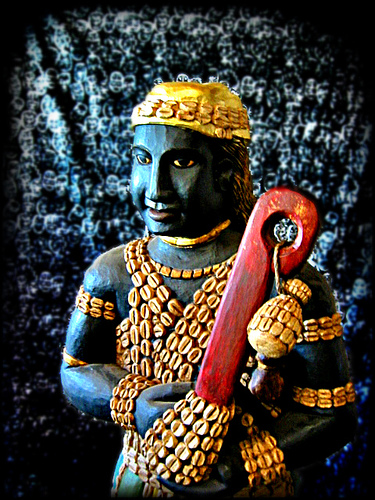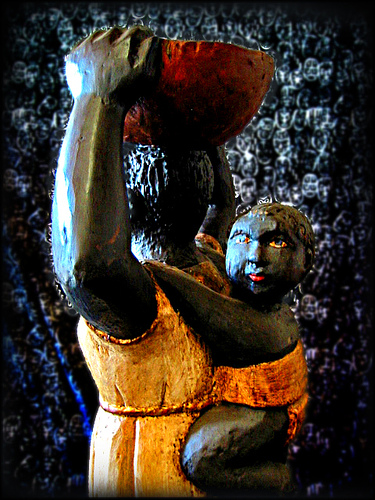
Polychromed woodcarving of an Orixá by Luiz Paulino da Cunha. Photo by Children At Risk Foundation [1]
Angola and Brazil have a special relationship [2] towards each other, partially because of their common language and their shared colonial past – both countries were part of the Portuguese Empire [3] – and the cultural ties that stem from this shared history. Since 2000, commerce between the two countries has started to grow and it is now booming. According to the Association of Brazilian Companies in Angola (AEBRAN), trade between the two countries [4] has risen six-fold since 2002.
With the increase in trade, the presence of Brazilian companies in Angola has also grown. Consequently, immigration from Brazil to Angola has increased too, 70 percent over the last five years. There are an estimated 5,000 Brazilians registered in Angola [5], mainly working for construction, mining and agribusiness companies. This new development in Angolan history, a country which was more accustomed to immigration to the other side of the Atlantic, leads to an unavoidable culture shock for both Brazilians and Angolans alike.
Below are two entire blog posts showing different perspectives of one people towards the other, raising issues of immigration, racism, ethnicity and mutual respect. Above all, they illustrate the complex and diverse relationship – with all of the inevitable similarities and differences – of siblings growing up an ocean apart.

Polychromed woodcarving of a slave by Luiz Paulino da Cunha. Photo by Children At Risk Foundation [1]
Migas [6] [pt], a Brazilian living in Luanda, says the following:
Sempre vi as eleições em Setembro de forma positiva. Optimista de que os episódios de violência do passado não voltarão a acontecer. Qualquer um é unânime em concordar que o país precisa de paz para prosseguir com o crescimento económico, desenvolvimento, qualidade de vida dos cidadãos. Talvez este último seja o objectivo mais “esquecido”. Contudo, o acontecimento aproxima-se. 5 de Setembro foi a data escolhida e qualquer um está com muita expectativa. Angolano ou estrangeiro.
I have always seen the September elections in a positive way. I'm optimistic that the episodes of violence of the past will no longer happen. Everyone is unanimous in agreeing that the country needs peace to pursue economic growth, development, quality of life. Maybe the latter is the most “forgotten” goal. However, the event is approaching. September 5 is the date chosen and everyone awaits it with great expectation be they Angolans or foreigners.
Vivo num condomínio em que sou a única estrangeira. Todos os outros vizinhos são negros, pertencentes a uma classe que eu não consigo identificar. Não são ricos nem pobres. Mas também não são classe média. Eu diria que são mais pobres do que ricos, segundo os meus padrões. Mas, são ricos o suficiente para terem água nos reservatórios, gerador, carros e comida na mesa. Num dos últimos fins-de-semana, houve festa numa das casas do condomínio. Ao que parece, um aniversário. Arrependi-me da minha opção em ficar em casa, nessa noite de Sábado.
I live on an estate where I am the only foreigner. All other neighbors are black, belonging to a class that I can not identify. They are neither rich or poor. But they are not middle class either. I would say they are poorer than rich, according to my standards. However, they are rich enough to have water in their reservoirs, power generators, cars and food on the table. On one of the past weekends, there was a celebration in one of the other houses on the estate. Apparently, a birthday party. I regret my choice to stay at home on that Saturday night.
A festa prolongou-se até de madrugada com o DJ a esmerar-se na escolha das músicas. Para meu desespero já que tinha decidido ficar em casa para dormir cedo. Depois de chegar das compras, por volta das 10h da noite, vi que no meu lugar de estacionamento tinha outro carro. Não pedi para tirarem mas antes, para darem um “jeitinho” (à boa maneira do Norte) para que pudessem ficar os dois. O meu e o do convidado. O convidado, nitidamente bêbado, mandou-me esperar e voltou à festa, supostamente em busca da chave. Minutos depois, tinha-se esquecido do meu pedido e já dançava junto com os outros.
The party lasted up to dawn with the DJ's bright choices of music. To my despair I had already decided to stay at home to sleep early. After arriving from shopping, around 10pm, I saw that another car was in my car parking space. I didn't ask them to take it away but to find a “quick fix” (in the good, Northern way) so that both [cars] could be there. Mine and the guest's [car]. The guest, clearly drunk, left me waiting and returned to party, allegedly in search of the car keys. Minutes later, he had forgotten my request and was dancing with the others.
Consegui resolver a questão de outra forma mas, confesso que não gostei da atitude. Esta história ilustra a minha verdadeira preocupação. Não tenho dúvidas que as eleições vão dar lugar a muita bebedeira, festa, comportamentos exagerados. E isso preocupa-me. Se até agora nunca tinha sentido desconforto por morar num local onde a minha casa é a única de “brancos”, nessa noite percebi que as “biricocas” podem desencadear episódios desconfortáveis mesmo em locais onde nos sentimos bem.
I managed to sort the issue out somehow, but I confess I did not like the attitude. This story illustrates my real concerns. I have no doubt that the elections will lead to much drunkenness, parties, unreasonable behavior. And that worries me. If up to now I had never had a sense of discomfort for living in a place where my home is the only “white” person's, I realized that night that the “drink fueled parties” may trigger uncomfortable episodes, even in places where we feel good.

12-year old Naomi Leonardo de Queiros [7], photo by Children At Risk Foundation [1]
Below is a different perspective, on another party and the whole new immigration scenario, by Gil Gonçalves [8] [pt], an Angolan citizen:
Em Luanda, as empresas brasileiras praticam o subimperialismo americano. O Brasil é uma colónia dos EUA. Muitos… mas mesmo muitos brasileiros chegaram, chegam a Luanda, como sardinhas enlatadas.
In Luanda, Brazilian companies engage in American sub-imperialism. Brazil is a USA colony. Many, really too many, Brazilians have arrived and still arrive in Luanda like canned sardines.
Na Movicel, empresa de telecomunicações onde detêm as garras no marketing, mandam vir os seus irmãos e irmãs, como técnicos altamente especializados. Os luandenses ensinam-nos a trabalhar, pois os pobres chegam aqui analfabetos. No Brasil parece não existirem universidades, ou então as existentes não funcionam. Ganham milhares de dólares, com direito a milhares de mordomias. E os luandenses míseros dólares. Há que manter o legado colonial.
At Movicel, a telecommunications company where they hold tight to the marketing department, they bring their brothers and sisters as highly skilled technicians. The Luandaners teach them to work, because those poor people arrive here illiterate. In Brazil it seems that there are no universities or the existing ones do not work. They earn thousands of dollars, and have the right to thousands of luxuries. And Luandaners earn meager dollars. The colonial legacy must be kept.
Brasileiros e brasileiras infestaram um hotel, é só deles e delas. Elas fumam bwe, parecem vulcões em permanente actividade. De vez em quando dão festa no terraço. Como bons analfabetos sociais imprimem desalmado som musical que permite aos colonizados luandenses não dormirem. Eles e elas não sabem, fingem não saberem, que em Luanda poluição sonora é crime. Estrangeiros que não respeitam as leis do país de acolhimento tem direito à expulsão. Mas como isto é deles e de alguns amigos luandenses…
Brazilian men and women have infested a hotel, it belongs to only them. They smoke a lot, they look like volcanoes in constant activity. From time to time, they throw a party on the terrace. As good social illiterate people they play wicked music that allows no colonized Luandaners to sleep. They do not know, they pretend not to know, that in Luanda noise pollution is a crime. Foreigners who do not respect the host country's laws deserve to be expelled. But as it [the hotel] belongs to them and some of their friends from Luanda…
O espanto nisto tudo é que eles e elas “brasileirada” são todos… brancos e brancas. Cadê os negros? As negras? Fugiram para o quilombo do Zumbi dos Palmares? Foram deportados para um campo de concentração nazi? Esconderam-nos na floresta do Amazonas? Exterminaram-nos? Estão proscritos? Enfeitam algum jardim zoológico? Deitaram-nos ao mar?
The surprise in all this is that the Brazilians… are all white. Where are the black men? The black women? Have they run away from Zumbi quilombo [9]? Were they deported to a Nazi concentration camp? Are they hiding in the Amazon jungle? Have they been exterminated? Are they outlawed? Ornamenting a zoo? Thrown into the sea?
Porque não tem a coragem de afirmar publicamente que negro brasileiro não existe no Brasil!
Why not have the courage to state publicly that there are no black Brazilians in Brazil!
The pictures that illustrate this piece are from the Symbols and Symbolism Flickr photo set [10] by the Children At Risk Foundation [1] and used under a Creative Commons license. They portray the 300-year history of enslavement in Brazil and its impact on that country, such as the Candomblé [11] legacy. Below is their caption:
The Negro was uprooted from his land and sold as merchandise, enslaved. In Brazil he arrived as slave, object; from his land he departed as a free man. During the journey, the slave traffic, he lost his personality, but his culture, his history, his landscape, his experiences; they came with him.
300-year history of Negro enslavement in Brazil has made an impact on this country. Candomblé is one such impact, a religion filled with many secrets, symbols and rituals known only to initiates but it is also a vital part of cultural expression in Brazil. There are no definitive numbers on how many people in Brazil follow Candomblé. The government estimates, conservatively, that there are more than 300,000 centers of worship for Brazil's Afro-Brazilian religions, which include Candomblé. Those participating in these faiths are thought to make-up at least one-third of Brazil's near 170 million inhabitants. Many practice both Catholicism and Candomblé.
Bahia, the state with the largest percentage of Blacks, is the capital of this religion, which closely follows its African roots and traditions among the Yoruba people of Nigeria and the Bantu people of Angola and the Congo. Yoruban traditions, including the most commonly used names of the Orixás (gods of the African pantheon), predominate.
Today Candomblé is officially recognized and protected by the government of Brazil. However, during the period of slavery and for many decades following its abolition in Brazil in 1888, Candomblé practices were banned by the government and by the Catholic church, and its practitioners were severely punished.